Let’s take a look at what happened in January 2024 at RCI:
1) Workshop on 2050 scenario and bio-/synthetic fuel demand in Europe
On 11 January 2024, RCI organised a joint workshop on the new 2050 scenario for a net-zero chemical industry, 50 RCI participated in the workshop and the discussions. A second topic was the biofuel (and synthetic fuel) policy, esp. Sustainable Aviation Fuel (SAF) policy and quotas and the supply implications for the chemical industry (project: “Biofuels Transformation Strategy”).
Participants were particularly interested in discussing how to take the project forward under the trajectory of increasing biofuel demand by 2050. To this end, key questions were formulated and a key message to policy makers will be developed.
To participate in these high-level expert workshops for free (more will follow this year), simply become an RCI member!
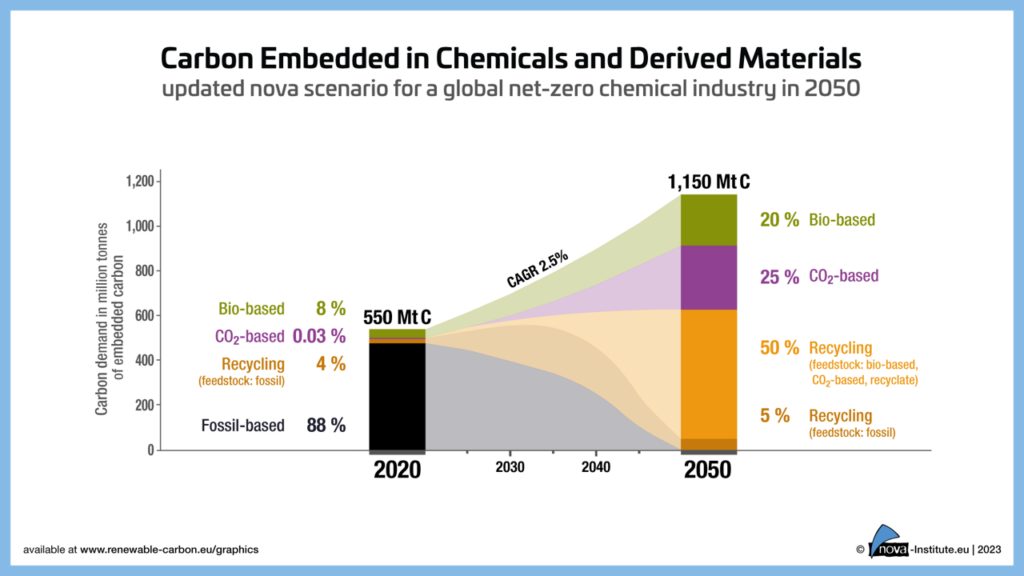
2) RCI Survey Insights: Navigating the Transition to Renewable Carbon
In a recent member survey conducted during the summer of 2023, the RCI has gathered valuable insights and opinions on the critical steps needed to facilitate the transition from fossil to renewable carbon within the European chemical and material sector.
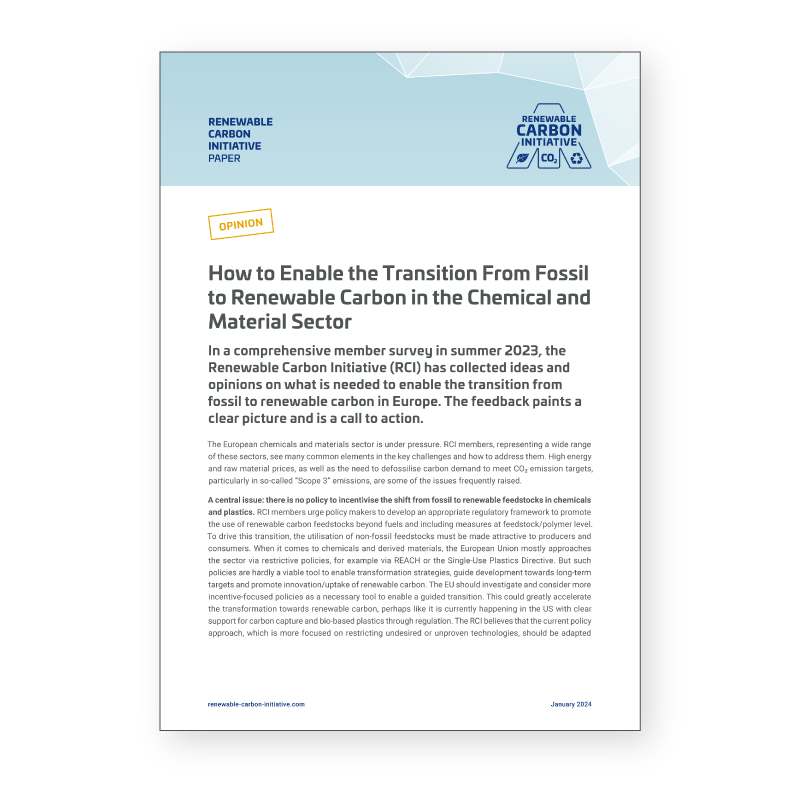
Key Points:
- Shared challenges: High energy costs and the need to defossilise carbon are common concerns.
- Policy Gap: Members highlight the need for policies that promote renewable feedstocks and incentivise industry transition.
- Incentive-based approach: There’s a call for incentive policies similar to those in the US that support carbon capture and bio-based plastics.
Europe’s strengths & global competition:
- Advantages: Europe’s education, diversity and infrastructure are strengths, but swift action is needed to compete globally.
- Incentivising change: Europe’s sustainability mindset can drive rapid change with the right incentives.
Proposed actions for a sustainable future:
- Supporting the transition: Proposals include minimum quotas, fossil carbon taxes and Extended Producer Responsibility (EPR) for an effective transition.
- Policy frameworks: Demand creation through policies such as carbon accounting, CO2 border adjustment and sustainable production verification.
- Three pillars of sustainability: Emphasising the combination of biomass, CCU and recycling for a closed carbon cycle.
- Green energy expansion: Emphasise the importance of expanding green energy supply for all production sectors.
Full version can be downloaded here: https://renewable-carbon.eu/publications/product/rcis-internal-survey-january-2024/
3) Pitching session at the European Chemistry Partnering in Frankfurt on 06 February 2024
On 6 February 2024, the 8th ECP (European Chemistry Partnering) event will take place in Frankfurt, Germany. ECP is a partnering event with a focus on tech scouting, bringing together new ideas and start-ups with larger companies and investors. As always, the focus will be on exchanging ideas and networking with old and new business friends in the traditional 20-minute Partnering Talks, which can be pre-arranged via the Internet. Keynote speeches and short presentations will provide additional stimulus for discussion.
As a partner of ECP, RCI has been invited to host a one-hour pitching session at the ECP.
The website of the ECP can be found at https://ecp.european-chemistry-partnering.com/8th-ecp/
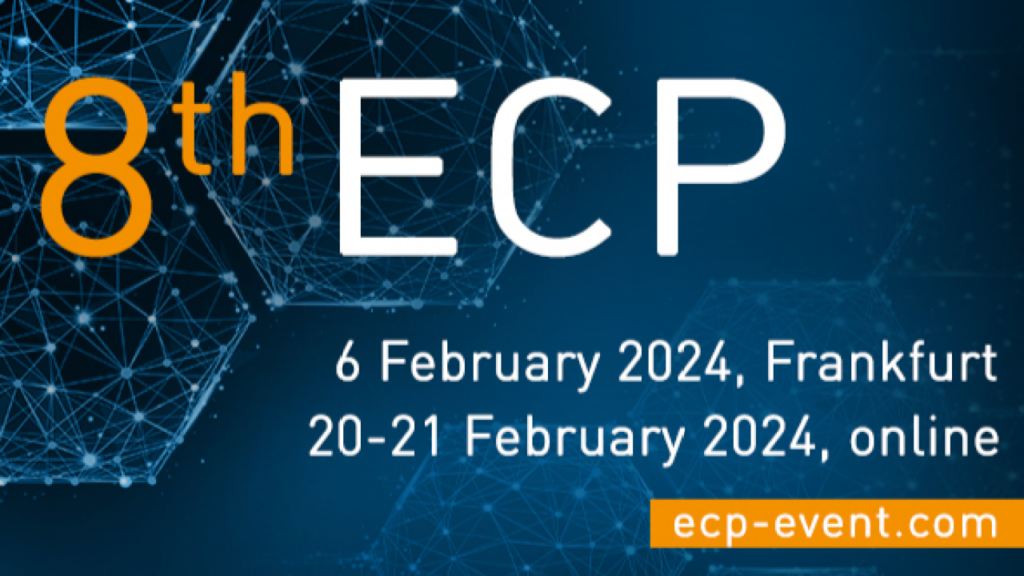
4) Upcoming free RCI webinar on 29 February 2024
During the next RCI webinar on 29 February 2023, 14:00 to 15:00 h CET, Christopher vom Berg of RCI is going to introduce the Renewable Carbon Initiative and the Renewable Carbon Strategy, and focuses on the upcoming scientific background paper “Non-level Playing Field for Renewable Materials vs. Fossil in Life Cycle Assessments – Critical aspects of the JRC Plastics LCA methodology and its policy implications”.
You are cordially invited to join us for this free webinar.
Please feel free to join us: https://renewable-carbon-initiative.com/events/
5) Welcoming our newest RCI member
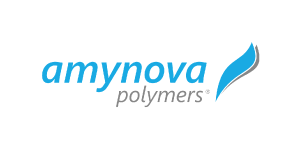
amynova Polymers (DE) is a company that develops, researches, and manufactures amylofol®, an innovative, starch-based biopolymer. Due to its unique characteristics, amylofol® has a high potential for increasing crop protection and fertilization efficiency in agricultural production, as a barrier coating on paper and packaging, and for dust binding in different industries and the environment. amylofol® can also be used as a formulation aid for cosmetics and personal care and as a lubricant in industrial processes. amylofol® can replace conventional polymer substances that are difficult to degrade and harmful to health and the environment and thus fulfil already today’s European requirements.
Find out more here: https://www.amynova.com/en/
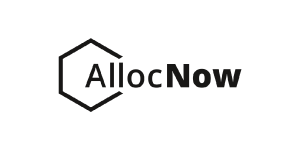
AllocNow(DE) was founded by a multi-disciplinary team with extensive experience in the chemical and process industries. Today, AllocNow is an agile and growing software company with experts in Life Cycle Assessment, data engineering, product design, software development and cloud engineering. AllocNow’s vision is a world free from the negative environmental impacts of industrial production. Its mission is to enable customers to understand, manage and communicate the environmental impact of all their products.
Find out more here: https://www.allocnow.com
Source
Renewable Carbon Initiative, original text, 2024-01-26.
Supplier
Renewable Carbon Initiative (RCI)
Share
Renewable Carbon News – Daily Newsletter
Subscribe to our daily email newsletter – the world's leading newsletter on renewable materials and chemicals













